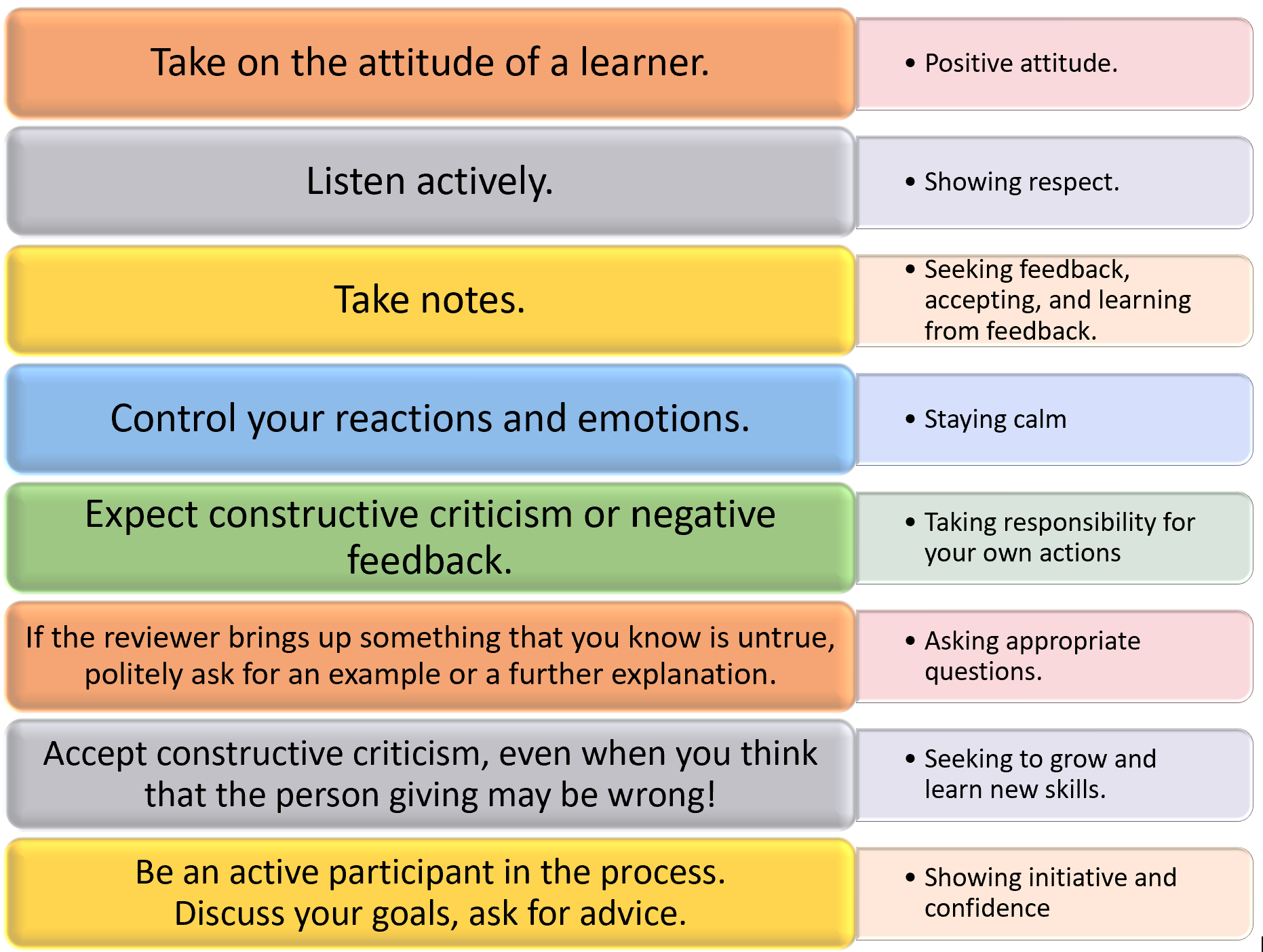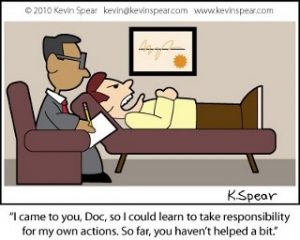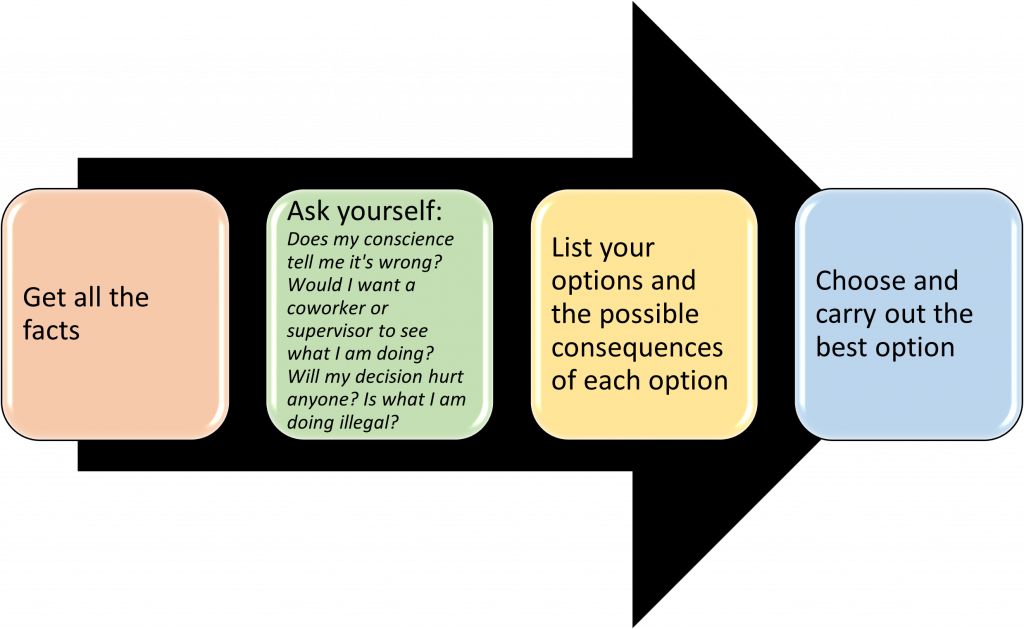1 Professionalism
Do you want to get a position in your chosen field?
Do you want to keep your job?
Do you want to get promoted?
Do you want to experience pride and satisfaction in your job?
Develop Professionalism
Let’s begin by defining what professionalism is all about.
As you read through each characteristic of professionalism, ask yourself the questions after each paragraph. Answer honestly and realize that everyone has areas that require growth and development.
Be Appropriate
Avoid oversharing personal or family information with your coworkers or boss.
Fisher, A. (2015, June 29). Communication tips: Oversharing, and how to avoid it [Video]. YouTube.
Be careful what you say and post about work (Mind Tools Content Team, n.d.). A best practice is to avoid talking about any work-related issues with people outside of your closest family and friends, and even then, you should be cautious. Word can spread like wildfire and you wouldn’t want to lose your job over hearsay. Refrain from complaining about work and posting negative work-related content on social media. Despite your privacy settings, you can’t be sure that that information won’t get back to your employers or colleagues.

Be Presentable and Dress Appropriately
Always maintain a level of professionalism through your work attire, hygiene, and visual presentation (Piccirilli, 2018). Take note of the workplace dress code; until you have a better idea of what it is, take a conservative and simple approach to dress. Even if your workplace is more casual in nature, it is important to come to work clean, neat, and well-groomed. If you are representing yourself professionally, you are helping the employer to be seen in a professional light as well.
Reflection Questions
- Do you take time to prepare yourself before work (showering, wearing deodorant, grooming)?
- Are you able to identify work-appropriate clothing in your wardrobe?
Be Punctual and Respectful

Consistently showing up for work and showing up on time indicates that you’re serious about your job. It’s not only important to be punctual about arriving to work, but also to be on time for meetings and follow the prescribed times for breaks or other scheduled work gatherings. If you know you are going to be late, be courteous: pick up the phone or send an email and let your employer know when you will be there (always offer to reschedule if that is more convenient for others). When you are able to meet your commitments, it tells an employer that they can depend on you.
Reflection Questions
- Are you often late for work, or meetings, or do you take longer breaks?
- Do you generally take a lot of sick days?
Clarify Expectations and Ask for Feedback
Sometimes an employer may not have the time or resources to review your job expectations with you in detail. To ensure you’re performing adequately at your new job, review your job duties very carefully, then identify your main responsibilities and how much time you should be spending on each. This is a fail-proof way to ensure you’re on target with what your employer expects, however, if you are unclear about what this looks like, don’t hesitate to clarify at any time. Along the same lines, if you want to make sure you’re on the right track, set up a time to meet with your manager and ask for feedback on your progress so far (Indeed Editorial Team, 2021).
Being Professional During a Performance Appraisal
Tips for actively and professionally approaching a performance appraisal

Note. Adapted from Indeed Editorial Team, 2021. [Image description].
Reflection Questions
- When you start a new job, can you clearly identify your roles and responsibilities (Indeed Editorial Team, 2021)?
- Do you wait to be told you’re doing something wrong before asking for feedback?

Be Honest and Own Your Mistakes
It’s not the end of the world if you make a mistake on the job, it just makes you human. The worst thing to do is to lie about it. If you take responsibility for your mistake and avoid making excuses, it will show a great deal of maturity (Half, 2016). Employers will appreciate your honesty and your ability to handle a situation like this. If you show them you’re willing to learn the proper way to do something, to avoid this happening again in the future, you will be more likely to build a trusting relationship (Piccirilli, 2018).
Reflection Questions
- Are you scared to admit when you make a mistake, out of fear that you might get in trouble?
- When an error has occurred, do you make excuses or find a way to shift the blame?
Strengthen the Team by Developing Positive Workplace Relationships

There are so many benefits to developing strong relationships among your team members. When you are able to get along with your colleagues, work gets done more effectively and efficiently. Don’t get caught up in water cooler conversations or office gossip. Remember to show respect to all members of your team, and listen attentively without interrupting. Your employer will be relieved when they don’t have to spend their valuable time resolving petty interpersonal issues.
Reflection Question
- Do you have strong relationships with the people you have worked with or gone to school with?
Be Visible, Show Initiative, and Offer to Help

Take opportunities to volunteer for upcoming projects or committees. The more visible you are in the work activities you’re taking part in, the more valuable you will be seen to your employer. Likewise, employers appreciate when employees offer to help and recognize when something needs to be done without having to tell them to do it (Half, 2016). Look for opportunities to show your initiative by doing something you think may be helpful for the company, to improve a process, or assist a colleague, and your employer is guaranteed to be impressed.
Reflection Questions
- Do you ever volunteer to be part of different opportunities that come up at work?
- Do you have the confidence to suggest different ways of doing things, in order to increase productivity, accuracy, or efficiency?

Follow Through on What You Say
Be a person of your word, if you can be relied on to do what you say you’re going to do, an employer is eventually going to see you as their go-to person (Mind Tools Content Team, n.d.). When your words match your behaviours, it makes it easier for an employer to trust you and they will ultimately be more likely to recommend, praise, and invest in you. On the contrary, not actively following through on what you say can paint a negative picture of you to an employer; they may assume you are undependable or even uninterested in the job.
Reflection Question
- Do you tend to follow through on your promises in your personal and professional life?
Be a Person with Integrity and Strong Ethics
Ethical Responsibilities in Health Care:

- Confidentiality
- Commitment to quality
- Consideration of employer’s and College’s reputation
Why be ethical?
As a member of the health care team, you have a responsibility to:
- Your profession: to uphold excellence in all clinical and administrative duties.
- The public: to practice in a competent, responsible, and respectful manner.
- Your employer: to be faithful, accountable, and adhere to the principles of the workplace.
- Your colleagues: to recognize their rights and treat them as you want to be treated.
Why do employees do unethical things?
- Lack of integrity
- Job dissatisfaction-feel they are overworked or underpaid (going to get their money’s worth one way or another-so, make their long-distance calls at work, take home supplies, etc.)
- Financial reward-make a little extra money by padding expenses
- Pressure to meet goals
- May not know or understand the code of conduct
What types of unethical behaviour exist in the workplace?
Misuse of technology: Using office computers for personal reasons, using cell phone during work hours.
Abuse of privilege: Misusing the rights and power given to you by your position for personal benefit or at the expense of another person.
Conflict of interest: Situations in which a person’s own interests/desires/needs could influence decisions they have to make in their role as an employee.
Preferential treatment: Treating one person or a certain group of people better than you treat everyone else.
How to Handle an Ethical Dilemma
Four Steps to follow when making an ethical decision at work.
 Note. [Image Description]
Note. [Image Description]
Demonstrate a Positive Attitude

You may have experienced working with someone negative in the past, which is why it’s so important for employers to want their employees to exhibit positivity. If you have a bad attitude this may impact how well you do your job or how you communicate with other people. People tend to remember the bad things; you certainly don’t want your employer to remember you as the complainer. Positivity is a highly sought-after quality on the job, as it tends to be a morale booster and increase the enjoyment of a work environment significantly.
Reflection Questions
- Do you find it difficult to show enthusiasm about the work you’re doing?
- Do you catch yourself complaining about things on the job?
Know and Understand Your Role and Your Scope of Practice and Ask for Help When Needed

Many of us make the mistake of wanting to prove we can do something on our own, or sometimes we’re just scared to ask for help because we think it might be seen unfavourably by our managers (Mind Tools Content Team, n.d.). The opposite of this is true; employers want you to ask questions and ask for help when you’re unsure of how to do something. Employers would rather you ask the questions you need in order to do the job correctly than potentially costing them time and money on careless, easily preventable mistakes. That being said, if you have a number of questions, collect them and schedule a time to meet with your manager to discuss them all at once – this will eliminate multiple interruptions.
Reflection Questions
- Are you reluctant to ask questions about tasks you are unsure of how to do?
- Do you feel comfortable approaching other colleagues or your supervisor for help?
Be Competent and Knowledgeable and Develop Yourself Professionally

Be open to learning new things; employers are interested in having skilled and knowledgeable workers. By showing your commitment to continual learning, you’re showing them that it is important for you to be able to do your job well, which reflects positively on the company (Piccirilli, 2018). By training in something that makes you a subject matter expert, you will make yourself a more valuable asset to the team. Employers are often impressed when employees show an interest in growing their skills; from these ideas, concrete professional goals can be developed.
Reflection Questions
- Do you take advantage of professional development opportunities when they present themselves?
- In your previous jobs, have you taken the time to identify what you wanted to get out of your experience?
Be a Problem Solver and a Peacemaker

Regardless of the job, we can’t escape day-to-day problems, whether they are personality differences between colleagues or roadblocks in our daily tasks or projects. What’s important for an employer to see is how you’re able to handle it when the situation is appropriate. An employer is seeking those that can manage conflict through effective negotiation and communication skills in a diplomatic, respectful, and calm manner. Furthermore, when you are able to manage unforeseen problems by identifying a plan and proposing possible solutions, you are taking this off the employer’s plate and allowing them to spend their time managing more pertinent concerns (Half, 2016). When an employer has to frequently intervene in these situations it can take away from how competently they view you in your role.
Reflection Question
- Are you able to effectively manage conflict without calling on the assistance of your superior?

Be Self-Aware
Be honest with yourself (and others!) about your strengths and your challenges. Realize that you are not perfect and that every person needs to grow and learn continually throughout their careers. Self-evaluate regularly and set specific goals for yourself that are both measurable and achievable. When you experience conflict or misunderstandings, ask yourself what you could have done differently. When you receive constructive criticism, consider ways in which you can improve.
Reflection Questions
- What strengths do you bring to your job and to the team?
- Which of your personality traits have sometimes caused difficulties for you or another person?
- What skills do you need to develop to be a more valuable employee?
Stay Calm in Stressful Situations and Manage Disappointment

Emotional intelligence is a highly-valued trait, both in the career world and in everyday life. Read this article to learn how to improve your emotional intelligence. Robert Half (2016) mentions a number of practical applications of this highly-valued trait, such as accepting the fact that life is not fair and finding joy in your coworkers’ successes instead of coveting them.
The Mind Tools Content Team (n.d.) explains that two vital components of emotional intelligence are becoming more self-aware to understand your own emotions and using active listening skills to learn empathy.
Resilience is closely related to emotional intelligence.
MindToolsVideos. (2018, September 29). Emotional intelligence in the workplace [Video]. YouTube.
Adapt to Change

With changes happening all around us, you’re bound to experience a number of work-related changes in your time. Being flexible and open-minded to those changes will help to reduce the amount of stress you are experiencing and allow you to navigate unexpected changes in your work environment in a more positive and constructive way. Work changes can take their toll on morale, when employees are more adaptable, they will help set the tone for a more seamless transition across the team.
Reflection Questions
- Do you get flustered when faced with change?
- Is it hard for you to get back on track when things fail to go according to plan?

Be Self-Motivated
Just like many workplaces, health and wellness workplaces are busy and employers value employees who can work with little-to-no supervision. This type of person sees what needs to be done and does it. They never sit idle and find ways to keep themselves busy by helping their colleagues or catching up on work that was left undone.
Reflection Questions
- What do you usually do when work is a bit slow?
- Can you find things to do without having to be told?
- When you have questions related to your job, do you make every effort to find the answers yourself before running to your supervisor?

Be Organized
Organization skills are important in every aspect of life and are absolutely essential to the workplace. Being organized decreases stress, saves time, and increases productivity. Piccirilli (2018) suggests keeping a tidy workspace and using a planner. Read this article to help you improve your organizational skills.
Reflection Questions
- Do you often spend valuable time looking for things that have been misplaced?
- Have you missed important deadlines, due dates, or appointments in the past?
SERVICE SHOUT OUT!
If you have a personal problem impeding your ability to obtain or maintain employment such as; anger, substance abuse, child care, housing, transportation, or other more pressing issues:
- Reach out to Counselling Services to develop more effective coping strategies and identify community resources.
myWellness – Student Success | Conestoga College - Make an appointment with the Employment Support Centre to discuss appropriate ways of discussing these issues with your supervisor.
myCareer – Student Success | Conestoga College - Inform someone close to you and ensure you have a support network in place.
Chapter References
Bortot, L., & Employment Support Centre. (2021, January 1). Be the boss of your career: A complete guide for students. Algonquin College. https://ecampusontario.pressbooks.pub/bethebossofyourcareer/. CC BY-NC-SA 4.0
Half, R. (2016, March 4). 30 character traits of mentally strong people. https://www.roberthalf.com/blog/management-tips/30-character-traits-of-mentally-strong-people
Indeed Editorial Team. (2021, July 20). 17 performance review tips for employees. Indeed. https://ca.indeed.com/career-advice/career-development/performance-review-tips-for-employees
Mind Tools Content Team. (n.d.). Professionalism meeting the standards that matter. Mind Tools. https://www.mindtools.com/pages/article/professionalism.htm
Piccirilli, G. (2018, January 2). Knowledge center: 10 characteristics of professionalism in the workplace. AAPC. https://www.aapc.com/blog/40477-10-characteristics-of-professionalism-in-the-workplace/
Figure Descriptions
Fig 1.1 This SmartArt graphic lists attitudes and actions to take in order to successfully navigate a performance appraisal. Listed beside each of these actions or attitudes is the aspect of professionalism demonstrated through that action or attitude.
- Attitude: Take on the attitude of a learner. Aspect of Professionalism: Positive attitude.
- Action: Listen actively. Aspect of Professionalism: Showing respect.
- Action: Take notes. Aspect of Professionalism: Seeking feedback, accepting and learning from feedback.
- Action: Control your reactions and emotions. Aspect of Professionalism: Staying calm.
- Attitude: Expect constructive criticism or negative feedback. Aspect of Professionalism: Take responsibility for your own actions.
- Action: If the reviewer brings up something that you know is untrue, politely ask for an example or a further explanation. Aspect of Professionalism: Asking appropriate questions.
- Attitude: Accept constructive criticism, even when you think that person may be wrong. Aspect of Professionalism: Seeking to grow and learn new skills.
- Action: Be an active participant in the process. Discuss your goals, ask for advice. Aspect of Professionalism: Showing initiative and confidence.
[Back to Figure 1.1]
Fig. 1.2 This SmartArt graphic indicates four practical steps to follow when faced with an ethical dilemma. The steps are:
- Get all the facts.
- Ask yourself: Does my conscience tell me it’s wrong? Would I want a coworker or supervisor to see what I am doing? Will my decision hurt anyone? Is what I am doing legal?
- List your options and the possible consequences of each option.
- Choose and carry out the best option.
[Back to Figure 1.2]

